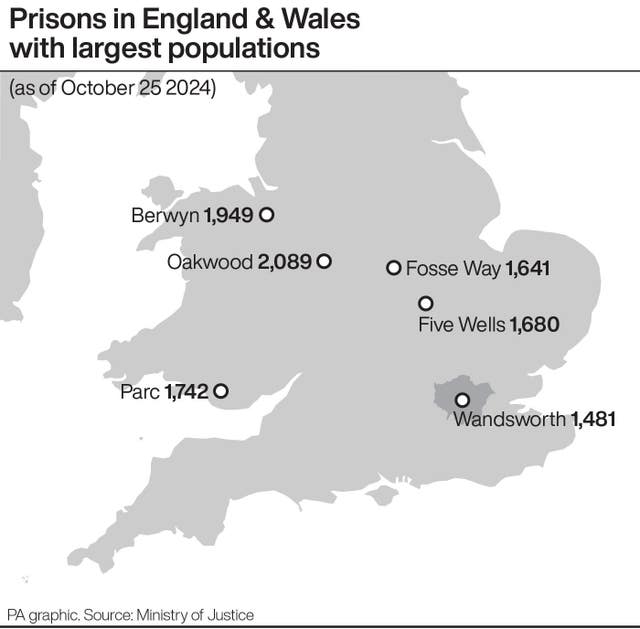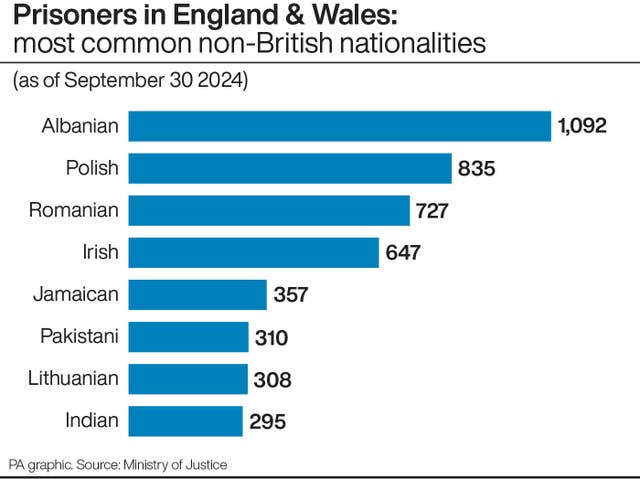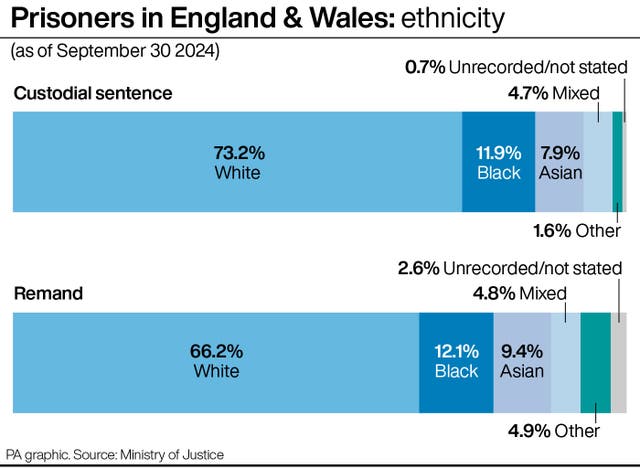Prisons in England and Wales will run out of space despite Government plans to build four more jails, the Justice Secretary has admitted.
Shabana Mahmood also suggested councils could be overruled to push through the construction plans in a bid to grip the overcrowding crisis, and hinted jury trials could be scrapped in some instances to cut the backlog of court cases.
It comes amid concerns over the prevalence and availability of drugs in jails as MPs heard contraband is being brought into prisons in children’s nappies.
Some 6,400 of these will be at newly built prisons, with £2.3 billion towards the cost over the next two years.
The remaining places will be found by measures including building new wings at existing jails, or by refurbishing cells currently out of action, and an extra £500 million will go towards “vital building maintenance”, the department said on Wednesday.
Asked whether the estate would run out of cells within three years, even with 14,000 extra places, the Justice Secretary told BBC Radio 4’s Today programme: “We will run out because even all of that new supply, with the increase in prison population that we will see as a result of that new supply, doesn’t help you with the rise in demand, because demand is still rising faster than any supply could catch up with.”

Prisons will be deemed sites of “national importance” amid efforts to prevent lengthy planning delays, with Ms Mahmood saying decisions on new prison building will be made by Deputy Prime Minster Angela Rayner, who is the Housing Secretary.
Asked whether the Government would “fast-track applications and overrule the objections of local people and local councils”, Ms Mahmood told BBC Breakfast: “Yes, so our manifesto commitment was that we consider prisons to be of national importance.
“These are critical infrastructure projects, they are absolutely necessary to make sure the country doesn’t run out of prison places.”
Asked about concerns people may have about a prison being built near their homes, she said: “We have to be honest about the fact that prison building is required.”

“We do have a crown court backlog that is very high and likely to rise because the sheer number of cases that are coming into the system is so big, that even if we were sitting at maximum capacity across the whole of the crown court, we still wouldn’t be able to touch the sides of that backlog.
“That does say that we need to think about doing things differently”, she said.
Her comments come a day after Home Office minister Dame Angela Eagle described suggestions about resorting to scrapping some jury trials as “one quite extreme way of looking at it”, telling Sky News “dispensing with jury trials is one difficult end of some of the decisions that might have to be made”.
The strategy document said HMP Millsike in Yorkshire will provide about 1,500 cell spaces next year. Another site in Leicestershire, which has already been granted planning permission, is set to make a further 1,700 prison places available.
About 1,500 cell spaces will be provided at a jail in Buckinghamshire while another prison will be built next to HMP Garth in Lancashire, offering 1,700 places.
According to the MoJ, both buildings have outline planning permission so far – which allows developers and landowners to provide information with a view to later making a more detailed proposal.
Housing minister Matthew Pennycook overruled planning inspectors, last week, to sign off the new site next to HMP Garth, which is due to be built on countryside usually protected from development called greenbelt land after more than three years of planning delays.
The announcement is in the wake of Government estimates published last week indicating more than 100,000 prisoners could be held in jails in England and Wales by 2029.

Since September, thousands of inmates have been freed early in a bid to cut jail overcrowding, by temporarily reducing the proportion of sentences which some prisoners must serve behind bars in England and Wales from 50% to 40%.
But prisons are still expected to reach critical capacity again by July.
MoJ figures show there were 86,089 adult prisoners behind bars in England and Wales on Monday.
The so-called operational capacity for English and Welsh men’s and women’s prisons is 88,822, indicating there is now cell space for 2,733 criminals.

“I want to avoid that scenario. We will not be doing that. There are other operational measures that we might have to take to try and stabilise the prison system … so more people potentially on home detention curfew.”
Campaigners have urged the Government to consider investing in other punishments instead of custody and focussing on rehabilitation to reduce offending rates as part of its ongoing sentencing review rather than looking to building prisons as the solution to the crisis.
But prisons minister Lord Timpson told the Commons Welsh Affairs Committee that the previous government “didn’t get planning permission and didn’t build prisons fast enough”, adding: “These prisons should have been built, and we will build those prisons.”






